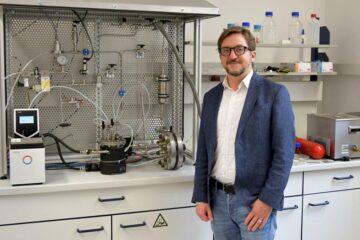"The First Three Years of the LHC": Experts discuss results derived from the "world machine"

The sensational discovery of the Higgs particle in the summer of 2012 put the Large Hadron Collider (LHC) into the spotlight of worldwide attention. At the same time, the breakthrough proved the enormous capability of the particle accelerator.
In order to upgrade the LHC for the use in experiments at even higher collision energies, it was shut down in February 2012. Following the initiative of the newly-founded Mainz Institute for Theoretical Physics (MITP), highly-renowned experts are meeting in Mainz from March 18 to 22, 2013 to investigate the results of the data collected by the LHC.
„It is highly appropriate that the inaugural workshop of MITP centers on the consequences emerging from one of the most profound discoveries of the past 30 years,“ Matthias Neubert, professor for theoretical particle physics at Mainz University and founding director of the institute, stressed in his opening remarks. „With the Higgs discovery, particle physics has entered a crucial stage of further development. The findings ahead could shape our worldview in a similarly revolutionary way as the theory of relativity or quantum mechanics did in the early part of the last century.“ The scientists currently assess the status of the analyses of the data provided by the LHC and estimate the potential for the discovery of new physics. New models could possibly replace the existing standard model of particle physics, which at present can only explain a fraction of matter in the universe.
MITP was established as part of the Cluster of Excellence PRISMA („Precision Physics, Fundamental Interactions and Structure of Matter“). About 250 scientists collaborate in this new research cooperation, which will receive funding of EUR 35 million over the next five years. The cluster focuses on central questions concerning the nature of the fundamental constituents of matter and their significance for the physics of the universe. MITP represents a major initiative of the cluster, which aims at becoming an international theory center in the long run. For this purpose, the institute organizes scientific programs, workshops, and conferences, in close cooperation with external researchers. It thus provides scientists from different research areas in theoretical physics with a unique opportunity for interdisciplinary exchange.
The current workshop „The First Three Years of the LHC,“ taking place at „Schloss Waldthausen“ in Mainz, pursues the goal of fostering discussions and close cooperation among the participants as well as developing new ideas and refining the calculation methods required for the interpretation of LHC data. The participants of the workshop work in different fields of high-energy physics. Among them are a number of highly acclaimed researchers from the U.S., as well as members of the LHC collaborations, who deal with the analysis of the recent experimental data.
Further information:
Professor Dr. Matthias Neubert
Founding Director of MITP und Head Coordinator of the PRISMA Cluster of Excellence
Institute of Physics: Theoretical High Energy Physics
Johannes Gutenberg University Mainz (JGU)
D 55099 Mainz
phone +49 6131 39-23681
fax +49 6131 39-24611
e-mail: neubertm@uni-mainz.de
http://wwwthep.physik.uni-mainz.de/site/people/neubert/
Further links:
www.prisma.uni-mainz.de
www.mitp.uni-mainz.de/
https://indico.cern.ch/conferenceOtherViews.py?view=standard&confId=217732 (Workshop)
Media Contact
Alle Nachrichten aus der Kategorie: Seminare Workshops
Neueste Beiträge

Ideen für die Zukunft
TU Berlin präsentiert sich vom 22. bis 26. April 2024 mit neun Projekten auf der Hannover Messe 2024. Die HANNOVER MESSE gilt als die Weltleitmesse der Industrie. Ihr diesjähriger Schwerpunkt…

Peptide auf interstellarem Eis
Dass einfache Peptide auf kosmischen Staubkörnern entstehen können, wurde vom Forschungsteam um Dr. Serge Krasnokutski vom Astrophysikalischen Labor des Max-Planck-Instituts für Astronomie an der Universität Jena bereits gezeigt. Bisher ging…

Wasserstoff-Produktion in der heimischen Garage
Forschungsteam der Frankfurt UAS entwickelt Prototyp für Privathaushalte: Förderzusage vom Land Hessen für 2. Projektphase. Wasserstoff als Energieträger der Zukunft ist nicht frei verfügbar, sondern muss aufwendig hergestellt werden. Das…





















